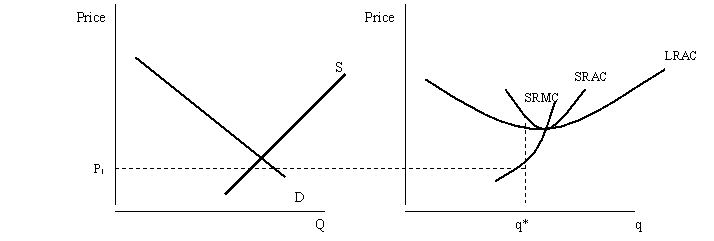Exam 9: Long-Run Costs and Output Decisions
Exam 1: The Scope and Method of Economics68 Questions
Exam 2: The Economic Problem: Scarcity and Choice50 Questions
Exam 3: Demand, Supply, and Market Equilibrium52 Questions
Exam 4: Demand and Supply Applications41 Questions
Exam 5: Elasticity74 Questions
Exam 6: Household Behavior and Consumer Choice50 Questions
Exam 7: The Production Process: the Behavior of Profit-Maximizing Firms64 Questions
Exam 8: Short-Run Costs and Output Decisions59 Questions
Exam 9: Long-Run Costs and Output Decisions87 Questions
Exam 10: Input Demand: the Labor and Land Markets77 Questions
Exam 11: Input Demand: the Capital Market and the Investment Decision66 Questions
Exam 12: General Equilibrium and the Efficiency of Perfect Competition44 Questions
Exam 13: Monopoly and Antitrust Policy45 Questions
Exam 14: Oligopoly53 Questions
Exam 15: Monopolistic Competition31 Questions
Exam 16: Externalities, Public Goods, and Social Choice54 Questions
Select questions type
Music.com is earning a total revenue of $100,000 per year. Its annual total fixed costs are $50,000 and its annual total variable costs are $175,000. What is the operating profit for Music.com? What is economic profit? Is this firm doing the right thing by continuing to produce in the short run? If conditions don't change what should this firm do in the long run?
(Essay)
4.8/5  (26)
(26)
Assume that a manufacturer of new handheld computer makes a sales pitch to a retailer in which he is willing to sell 5,000 at $10, 7,000 for $8, 9,000 for $7. But any orders above that amount will start costing the retailer more money on a per-unit basis. The president of the retailer asks why he can't get a discount if he orders more. Can you provide an answer that would help this president understand this apparent paradox?
(Essay)
4.7/5  (28)
(28)
The figures below show the supply and demand for a perfectly competitive industry and the cost curves for a representative firm in the industry. Explain what will happen in the long run in this industry. 
(Essay)
4.8/5  (39)
(39)
Books.com is earning a total revenue of $200,000 per year. Its annual total fixed costs are $50,000 and its annual total variable costs are $75,000. What is the operating profit for Books.com? What is economic profit?
(Essay)
4.9/5  (39)
(39)
What differentiates an increasing-cost industry from a decreasing-cost industry?
(Essay)
4.9/5  (33)
(33)
Showing 81 - 87 of 87
Filters
- Essay(0)
- Multiple Choice(0)
- Short Answer(0)
- True False(0)
- Matching(0)